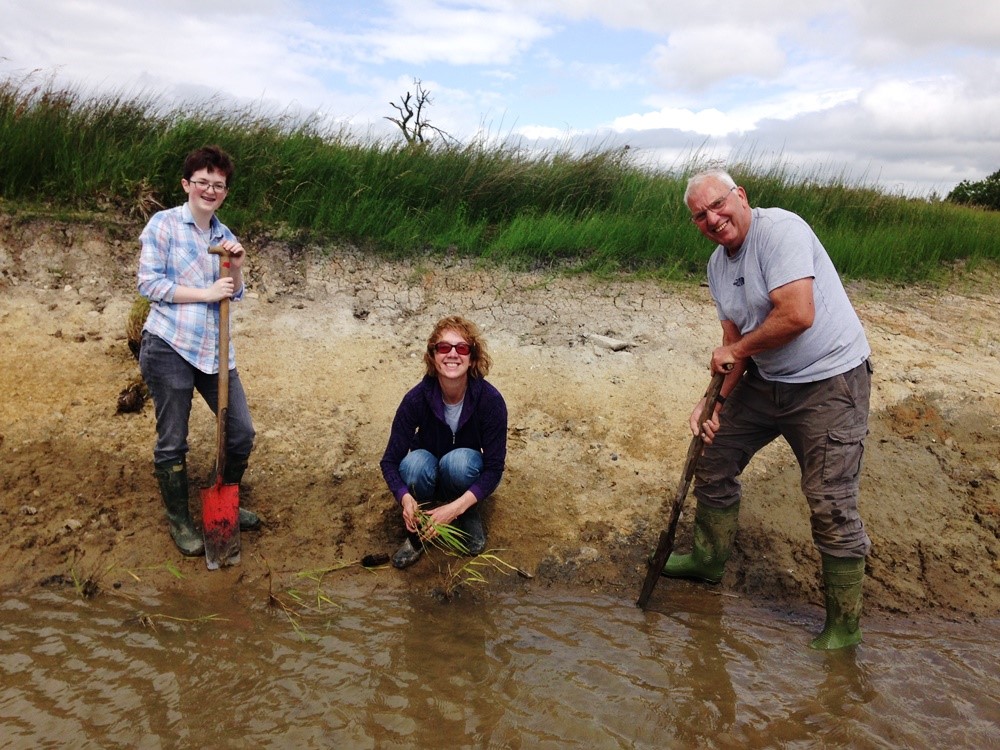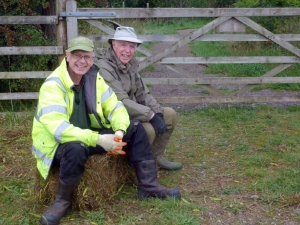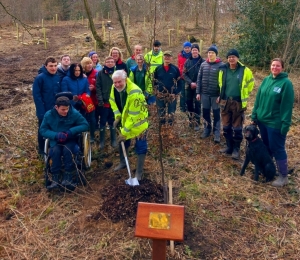Dung Beetles
Monday, July 9th 2018
Before we get onto Dung Beetles of the UK I must make mention of the kids from Great Smeaton School who found one during today's Mini-beast Hunt. Aside from searching for Scarabs the group also took part in Pond Dipping, Habitat Walks and Scavenger Hunt activities throughout a fun-filled day at Foxglove.

We had yet to reach the Outdoor Classroom to begin hunting for Mini-beasts when the best of the day's bugs was found.
I am yet to work out which of the 60 species of dung-feeding Scarab Beetles this is, having narrowed it down to a member of the Geotrupes family.

Dung Beetles are grouped according to how they use dung, in Britain we have Tunnellers (Paracoprids) and Dwellers (Endocoprids), but lack the most famous of the groups known as Rollers (Telecoprids).
Tunnellers dig, burying the dung below ground, where they lay eggs and larvae develop. Dwellers generally spend their entire life in the poo, although the larvae of some species are found just under the soil surface.
The individual that the kids from Great Smeaton found was heavily laden with mites, which upon first glance may look to be a bad thing. However transporting mites that eat dung breeding flies is just one of many ecosystem services that these incredible Beetles carry out.

Dung Beetles also dispose of dung, fertilize soil through burying, act as a food source for birds and bats, enhance soil structure, reduce greenhouse gases and improve drainage (these creatures are truly amazing!).
Unfortunately British Dung Beetles are in decline for a number of reasons, including the overwintering of livestock away from fields,short term rotation grazing, removal of permanent pastures, chemical fertilisation of pastures, removal of dung and worming of livestock.
When you look at this list of reasons you quickly notice that they do not apply to the management techniques used here at Foxglove, which is why I hope to see more of these marvellous Mini-beasts in the future.

(1) Comments:
Help Support Foxglove

Friends of Foxglove
The Friends of Foxglove Covert is for those individuals, families and organisations who would like to support the reserve through an annual membership subscription. Friends receive a regular newsletter and invitations to attend our various activities and social events.
More DetailsUpcoming Events
CLOSURE: Monday 22nd April 2024
Wednesday 17th April 2024 |
Due to an important event occuring on the camp, Foxglove Covert LNR will be closed for one day only on Moday 22nd April.
The reserve will resume usual opening hours on Tuesday 23rd April.
Access to the Reserve: OPEN with limited access
Monday 18th March 2024 |
The reserve is now open, although again with limited access.
Visitors will be able to access the reserve with the use of key fobs provided at the pass office upon entrance to the camp, or will be provided entrance and exit through the access gate by an officer from the camp Guard Room. In this case visitors will need a mobile phone to call the Guard Room when they wish to exit the reserve.
Please be aware that due to these circumstances, entering and leaving the reserve might take a little longer than usual.
Undergrowth Newsletter
View All The Newsletters
Recent Blog Posts
- Dead Hedging
- Beautiful Bird Boxes!
- Completed Coppice
- Unconventional Scything
- Garden Birds
- Winter Fungi
- Winter highlights
- Happy 2024!
- Wonderful winter workers!
- Making A Start
- Visitor Information (Update)
- Autumn Crafts and Autumn Colours
- Weekend Waxcaps
- Meadows and Ponds
- Meet Foxglove’s New Ranger
- All Work and No Play?
- Field Centre open Sunday 15th October 12 noon - 4.00pm
- Paving the Way
- Getting further, faster - together…
- Brian’s Baler!
- Reserve closed Tuesday 26th September 2023
- The Revolution has begun!
- Learning to Scythe with Steve Tomlin
- A fine time was had by all!
- Bird Ringing
- Galls
- Late Summer into Autumn
- News from the North
- Thank you!
- A Quiet Walk
- Hanging Around
- Mipits
- Common Lizards Again!!
- Species
- Bird Ringing
- Keeping Your Eyes Open
- Weekend opening hours Saturday 12th and Sunday 13th August
- We are recruiting!
- Thank yous and Bye Bye
- When the Sun Comes Out
- Weather and Flora and Fauna
- Volunteers at Work
- More Photos from the BBQ
- Jenga
- Volunteer and Bye Bye BBQ
- Summer
- Summer Work
- More Wildlife
- Wildlife
- A Good Growing Season
- Weekend opening hours Sat 22 & Sun 23 July 2023
- Moth News
- Butterfly Roundup
- More Moths
- Butterflies and Moths
- Weekend opening Saturday 8th and Sunday 9th July 2023
- Watching
- Juvenile Birds
- Common Lizards
- The Scrapes
- Nesting birds
- Ooohs and Ahhhs at the Moth Traps
- Co-operative Plants and Animals
- Summer Maintenance
- Moth Update
- Warm Days
- The Bees Return!
- June Flowers
- Lots of Legs
- Sharing Ideas
- Questions
- Caught Chasers!
- Some Bugs and Beasties
- Snow in June?
- Chasing the Chasers and Other Insects
- A Lesson - Perhaps?
- Small Nest Box Time
- Half Term Trail
- A Winding Way Through the Reserve
- Checking the Ponds
- Around the Reserve
- Moths and…
- Wildlife
- Living Creatures
- Roe Deer
- Dippers
- Dawn Chorus and Volunteering
- CES 1
- Hive of Activity
- Job Complete!
- Trial Run
- Flowers
- Natural England
- At Last
- Spring Sun Winter Wind
- Last Photos from Gibraltar and Shy Moorhens
- Winter or Spring?
- More Flowers and More from Gibraltar
- Reptiles
- Spring is Springing!
Blog Archive
- Blog Posts from - 2024
- Blog Posts from - 2023
- Blog Posts from - 2022
- Blog Posts from - 2021
- Blog Posts from - 2020
- Blog Posts from - 2019
- Blog Posts from - 2018
- Blog Posts from - 2017
- Blog Posts from - 2016
- Blog Posts from - 2015
- Blog Posts from - 2014
- Blog Posts from - 2013
- Blog Posts from - 2012
- Blog Posts from - 2011
- Blog Posts from - 2010
- Blog Posts from - 2009




Ceri Watkins responded on 11th Apr 2019 with...
Hi
Looks like Geotrupes spiniger. Lovely little beast and nice to see everyone had a good time on the minibeast hunt. Please can you submit the biological record to iRecord (https://www.brc.ac.uk/irecord)? Any records for other dung beetle sightings in the future would also be appreciated. You can also create an iRecord activity for the Nature Reserve which will log all the biological diversity that you find. Most find it a really useful tool to keep track of all the lovely
We do encourage sharing the dung beetle love (all DUMP material is licensed under Creative Commons), perhaps you could add a link or acknowledgment please.
Many Thanks